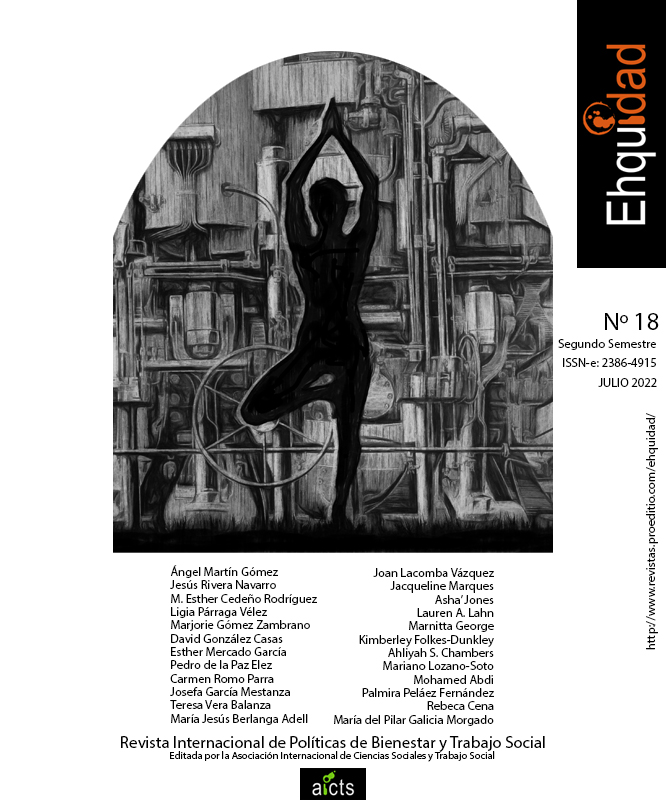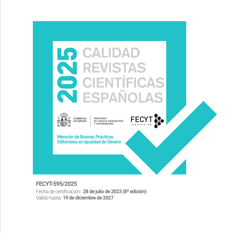Nuestro testimonio como guía: Estudiantes de color navegando un programa doctoral en tiempos de crisis política, racial y social
DOI:
https://doi.org/10.15257/ehquidad.2022.0017Palabras clave:
Justicia social, Reflexividad, Testimonio, Equidad, LatCritResumen
Utilizamos un enfoque narrativo en este estudio para transmitir nuestras experiencias como estudiantes de posgrado que manejan la triple pandemia de COVID-19, el malestar social y la salud mental de los estudiantes de doctorado de color. Usamos la práctica analítica de contar historias a través de testimonios para investigar cómo navegamos por las instituciones de educación superior mientras mejoramos nuestras posicionalidades frente a las barreras estructurales y los desafíos sociales. Hablamos de nuestros encuentros con el racismo, la discriminación y las estructuras de poder para demostrar la influencia de las presiones políticas y sociales que existen a medida que navegamos por el programa de doctorado. Creemos que si los administradores y educadores de la educación superior son conscientes de las experiencias de los estudiantes de color que navegan por el laberinto de los programas de doctorado, pueden desarrollar un currículo y estructuras de apoyo para ayudar a los candidatos doctorales a prosperar.
Descargas
Citas
Ahlers, A., & Arylo, C. (2019). Reform Your Inner Mean Girl: 7 Steps to Stop Bullying Yourself and Start Loving Yourself(Reprint ed.). Atria Books/Beyond Words.
Alba, A. L. del. (2007). Telling to live: Latina feminist testimonios. Duke University Press.
Alfaro, C. & Bartolomé, L. (2017). Preparing Ideologically Clear Bilingual Teachers: Honoring Working-Class Non-Standard Language Use in the Bilingual Education Classroom. Issues in Teacher Education. Volume 26, Number 2, Summer 2017.
American Council on Education (2019). Race and Ethnicity in Higher Education: A Status Report [report]. U.S. Department of Education. https://www.equityinhighered.org/indicators/enrollment-in-graduate-education/race-and-ethnicity-of-u-s-graduate-students/
Anzaldúa, Gloria. (2002). Now Let Us Shift...the Path of Conocimiento...Inner Work, Public Acts. Routledge. 540-57.
Artress, L. (1996). Walking a sacred path: Rediscovering the labyrinth as a spiritual practice. Penguin.
Au, W. (2017). When Multicultural Education Is Not Enough. Multicultural Perspectives, 19(3), 147-150.
Baker, R., Dee, T., Evans, B., & John, J. (2018). Bias in Online Classes: Evidence from a Field Experiment. CEPA Working Paper No. 18-03. Stanford Center for Education Policy Analysis.
Banks, T. & Dohy, J. (2019). Mitigating Barriers to Persistence: A Review of Efforts to Improve Retention and Graduation Rates for Students of Color in Higher Education. Higher Education Studies, 9(1), 118-131.
Bates, K. G., & Meraji, S. M. (2019, March 21). The Student Strike That Changed Higher Ed
Forever. NPR. Retrieved January 8, 2022, from https://www.npr.org/sections/codeswitch/2019/03/21/704930088/the-student -strike-that-changed-higher-ed-forever
Betancourt, J. R. (2020, October 22). Communities of color devastated by COVID-19: Shifting the narrative. Harvard Health Publishing, Harvard Medical School. https://www.health.harvard.edu/blog/communities-of-color-devastated-by-covid-19- shifting-the-narrative-2020102221201#:~:text=The%20numbers%20were%20astounding%3A%20Blacks,our%20nation's%20top%20hot%20spots
Bettez, S. C. (2011). Building critical communities amid the uncertainty of social justice pedagogy in the graduate classroom. The Review of Education, Pedagogy, and Cultural Studies, 33, 76-106.
Burciaga, R., & Cruz Navarro, N. (2015). Educational Testimonio: Critical Pedagogy as Mentorship: Educational Testimonio?: Critical Pedagogy as Mentorship. New Directions for Higher Education, 2015(171), 33–41. https://doi.org/10.1002/he.20140
Center for Disease Control (2021). COVID-19 Weekly Cases and Deaths per 100,000 Population by Age, Race/Ethnicity, and Sex. In COVID Data Tracker. https://covid.cdc.gov/covid-data-tracker/#demographicsovertime
Clance, P. R. & Imes, S. A. (1978). The impostor phenomenon in high achieving women: Dynamics and therapeutic intervention. Psychotherapy: Theory, Research and Practice, 1(3), 241–47.
Delgado Bernal, D., Burciaga, R., & Flores Carmona, J. (2012). Chicana/Latina Testimonios: Mapping the Methodological, Pedagogical, and Political. Equity & Excellence in Education, 45(3), 363–372. https://doi.org/10.1080/10665684.2012.698149
Delpit, L. (1988). The Silenced Dialogue: Power and Pedagogy in Educating Other Peoples
Children. Harvard Educational Review, 58(3), 280–299. Doi:10.17763/haer.58.3.c43481778r528qw4
Dixon, E., Anderson, P., Barrett, K., Garrido, R., Kane, E., Nancherla, B., Narichania, D., Narasimhan, S., Rabiyah, A., & Richart, M. (2014). 26 Ways to Be in the Struggle Beyond the Streets. Issu.1-4.
Flores, B. B., & Clark, E. R. (Eds.). (2017). Despertando el ser: Transforming Latino teachers' identities, consciousness, and beliefs. New York, NY: Peter Lang.
Fordham, S. (1993). “Those loud Black girls”: (Black) women, silence, and gender “Passing” in the Academy. Anthropology & Education Quarterly, 24(1), 3-32. https://doi.org/10.1525/aeq.1993.24.1.05x1736t
Foran, R. M. (2018). The Whiteness of the Elephant in the Room: How White Guilt, White Fragility, and Colorblind Racial Ideology Shape Environmental and Social Justice Activism in Santa Cruz County [Master’s Thesis, San Jose State University]. SJSU ScholarWorks.
Freire, P. (1970). Pedagogy of the oppressed. Continuum.
Fuentes, E. H. & Pérez, M. A. (2016). Testimonio as radical story-telling and creative soulful resistance. Association of Mexican American Educators, 10(2), 5-14
Garcia, M. A., Homan, P. A., García, C., & Brown, T. H. (2020). The color of COVID-19: structural racism and the pandemic’s disproportionate impact on older racial and ethnic minorities. The Journals of Gerontology: Series B.
Gaye, M. (1971). What’s Going On [Song]. On What’s Going On [Album]. Tamla Records
Giroux, H. (2015, October 22). Where is the Outrage? Critical Pedagogy in Dark Times. [Video file]. Youtube. https://www.youtube.com/watch?v=CAxj87RRtsc
Gore, J. M. (1995). On the Continuity of Power Relations in Pedagogy. International Studies in Sociology of Education, 5(2), 165-188. https://doi.org/10.1080/0962021950050203
Gorski, P.C. & Swalwell, K. (2015). Equity Literacy for All. Educational Leadership, 34-40.
Huber, L. P., & Cueva, B. M. (2012). Chicana/Latina Testimonios on Effects and responses to microaggressions. Equity & Excellence in Education, 45(3), 392–410. https://doi.org/10.1080/10665684.2012.698193
Jenner, B. M. (2017). Student veterans and the transition to higher education: Integrating existing literatures. Journal of Veterans Studies, 2(2), 26-44
Kim, Y. M. & Cole, J. S. (2013). Student Veterans/service members’ engagement in college and university life and education. Washington, DC: American Council on Education.
Lige, A., Peteet, B. & Brown, C. (2017). Racial Identity, Self Esteem, and the Impostor Phenomenon Among African American College Students. Journal of Black Psychology, 43(4), 345-357.
Lorick-Wilmot, Y. (2014). Between Two Worlds: Stories of the Second-Generation Black Caribbean Immigrant. Trotter Review, 22(1). https://doi.org.scholarworks.umb.edu/trotter_review/vol22/iss1/5
Love, B. L. (2014). “I See Trayvon Martin”: What Teachers Can Learn from the Tragic Death of a Young Black Male. The Urban Review, 46, 292-306.
Love, B. L. (2016). Anti-Black state violence, classroom edition: The spirit murdering of Black children. Journal of Curriculum and Pedagogy, 13(1), 22-25.
Lutz, A. (2008). Who Joins the Military? A Look at Race, Class, and Immigration Status. Journal of Political and Military Sociology, 36(2), 167-188.
Marrun, N. (2018). The power of ethnic studies: portraits of first- generation Latina/o students carving out un sitio and claiming una lengua. International Journal of Qualitative Studies in Education, 31:4, 272-292.
Mobley, C., Brawner, C. E., Lord, S. M., Main, J. B., & Camacho, M. M. (2018). Exploring the Experiences of First-Generation Students and Veterans in Engineering. In Proceedings of the 2018 Collaborative Network for Engineering and Computer Diversity (CoNECD) Conference. https://peer.asee.org/29538.pdf
Mohammad, M., Wallerstein, N., Sussman, A.L., Avila, M., Belone, L, & Duran, B. (2015). Reflections on Research Identity and Power: The Impact of Positionality on Community Based Participatory Research (CBPR) Processes and Outcomes. Critical Sociology, 41(7- 8), 1045-1063.
Murakami-Ramalho, E., Piert, J., & Militello, M. (2008). The Wanderer, the Chameleon, and the Warrior Experiences of Doctoral Students of Color Developing a Research Identity in Educational Administration. Qualitative Inquiry, 14(5), 806-834.
National Center for Education Statistics (2019). Indicator 23: Postsecondary Graduation Rates. In Status and Trends in the Education of Racial and Ethnic Groups [report]. https://nces.ed.gov/programs/raceindicators/indicator_red.asp
National Center for Veterans Analysis and Statistics (2017). Minority Veteran Report: Military Service History and VA Benefits Utilization Statistics. Washington, DC: Department of Veterans Affairs.
Neureiter, M., & Traut-Mattausch, E. (2016). An Inner Barrier to Career Development: Preconditions of the Impostor Phenomenon and Consequences for Career Development. Frontiers in Psychology, 7, 1-15.
Nuñez-Janes, M., & Robledo, A. (2009). Testimoniando: A Latina/Chicana critical feminist approach to racism in college. Chicana/Latina Studies, 9(1), 72-102.
Office of Disease Prevention and Health Promotion (2020). Social Determinants of Health [report]. U.S. Department of Health and Human Services. https://www.healthypeople.gov/2020/topics-objectives/topic/social-determinants-of-health
Paunesku, D., Walton, G. M., Romero, C., Smith, E. N., Yeager, D. S., & Dweck, C. S. (2015). Mind-Set Interventions are A Scalable Treatment for Academic Underachievement, Psychological Science, 26(6), 784-93.
Peteet, B. J., Montgomery, L., & Weekes, J. C. (2015). Predictors of Imposter Phenomenon among Talented Ethnic Minority Undergraduate Students. The Journal of Negro Education, 84(2), 175-186.
Pirbhai-Illich, F & Shauneen, P & Martin, F, (Eds.) (2017). Culturally Responsive Pedagogy Working towards Decolonization, Indigeneity and Interculturalism.
Pour-Khorshid, F. (2016). H.E.L.L.A.: Collective testimonio that speaks to the Healing, Empowerment, Love, Liberation, and Action embodied by social justice educators of color. Association of Mexican American Educators Journal, 10(2), 16-32.
Pour-Khorshid, F. (2020, May 16). Pedagogies Of Hope, Disruption, & Transformation. [Conference presentation]. 3rd Annual Central Coast Social Justice Education Conference,Virtual Conference, United States. Youtube. https://www.youtube.com/watch?v=NchK3Gxuxrg&t=4s
Pour-Khorshid, F., Machado-Casas, M., Talati, K., Gomez, D., & Castillo, G. (2020) Engaging in Testimonio as a walk through el laberinto (the labyrinth) of higher education: Releasing, receiving and returning to the field with deeper purpose. Tequio, 3(9), 25–48. https://doi.org/10.53331/TEQ.V3I9.0659
Rhee, E., Uleman, J. S., & Lee, H. K. (1996). Variations in collectivism and individualism by ingroup and culture: Confirmatory factor analysis. Journal of Personality and Social Psychology, 71(5), 1037-1054.
Ruiz, E. C., & Machado-Casas, M. (2013). An Academic Community of" Hermandad": Research for the Educational Advancement of Latinas (REAL), a Motivating Factor for First-Tier Tenure-Track Latina Faculty. Educational Foundations, 27, 49-63.
Russell, R. (2017). On Overcoming Imposter Syndrome. Academic Medicine, (92)8, 1070. http://doi.org.10.1097/ACM.0000000000001801
Saavedra, C. M., & Pérez, M. S. (2012). Chicana and Black Feminisms: Testimonios of Theory, Identity, and Multiculturalism. Equity & Excellence in Education, 45(3), 430–443. https://doi.org/10.1080/10665684.2012.681970
Sabo, S., Shaw, S., Ingram, M., Teufel-Shone, N., Carvajal, S., De Zapien, J. G., Rosales, C., Redondo, F., Garcia, G., & Rubio-Goldsmith, R. (2014). Everyday violence, structural racism and mistreatment at the US–Mexico border. Social Science & Medicine, 109, 66-74
Sandor, M. K., & Froman, R. D. (2006). Exploring the effects of walking the labyrinth. Journal of Holistic Nursing, 24(2), 103-110.
Stovall, D. (2006). Forging Community in Race and Class: Critical Race Theory and the Quest for Social Justice in Education. Race, Ethnicity and Education, 9(3), 243-259.
Stovall, D. (2015, October 18).We Still Need to Trouble the Water: Race, Revolution and the Struggle for Quality Education. 8th Annual Northwest Conference on Teaching for Social Justice. [Video file] Youtube. https://www.youtube.com/watch?v=i_bXao5zFtw
Tolnay, S. (2003). The African American “Great Migration” and Beyond. Review of Sociology, 29, 209-232.
Trauma Narratives. (n.d.). Retrieved from https://www.therapistaid.com/therapy-guide/trauma-narratives
Valdez, C., Curammeng, E., Pour-Khorshid, F., Kohli, Ri., Nikundiwe, T., Picower, B., Shalaby C., & Stovall, D. (2018). We Are Victorious: Educator Activism as a Shared Struggle for Human Being. The Educational Forum, 82(3), 244-258. http://dx.doi.org/10.1080/00131725.2018.1458932
Watts, R. J., Diemer, M. A., & Voight, A. M. (2011). Critical consciousness: Current status and future directions. In C. A. Flanagan & B. D. Christens (Eds.), Youth civic development: Work at the cutting edge. New Directions for Child and Adolescent Development, 134, 43–57.













